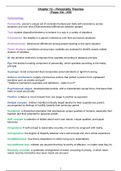Chapter 12 – Personality Theories
(Pages 332 - 359)
Terminology:
Personality: person’s unique set of consistent behavioural traits with consistency across
situations and over time (Distinctiveness=differences between people)
Trait: durable disposition/tendency to behave in a way in a variety of situations
Consistency: the stability in a person’s behaviour over time and across situations
Distinctiveness: behavioural differences among people reacting to the same situation
Factor Analysis: correlations among many variables are analysed to identify closely related
clusters of variables
ID: the primitive instinctive component that operates according to pleasure principle
Ego: the decision-making component of personality, which operates according to the reality
principle
Superego: moral component that incorporates social standards or right from wrong
Defence mechanisms: largely unconscious actions that protect a person from unpleasant
emotions such as anxiety and guilt
**Defence mechanism examples and definitions - table on p.5**
Psychosexual stages: developmental periods, with a characteristic sexual focus, that leave their
mark on adult personality
Fixation: a failure to move forward from one stage to another as expected
Oedipal complex: children manifest erotically tinged desires for their opposite-sex parent,
accompanied by feelings of hostility towards their same-sex parent
Humanism: a theoretical orientation that emphasizes unique qualities of humans, especially their
freedom and their potential for personal growth
Self- concept: a collection of beliefs about one’s own nature, unique qualities, and typical
behaviour
Congruence: If self-concept is reasonably accurate, it’s said to be congruent with reality
Incongruence: the degree of disparity between one’s self-concept and one’s actual experience
Conditional love: love that is dependent on child’s living up to expectations
Unconditional love: children are assured that they’re worthy of affection, no matter what they do
Hierarchy of needs: a systematic arrangement of needs, according to priority, in which basic
needs must be met before less basic needs are aroused
1
, Defining Personality: Consistency and Distinctiveness
Personality is used to explain:
- the stability in a person’s behaviour over time and across situations (consistency)
- behavioural differences among people reacting to the same situation (distinctiveness)
Personality Traits: Dispositions and Dimensions
Definition: Durable disposition/tendency to behave in a way in a variety of situations
Several theories are used to test core personality. All theories depend on factor analysis:
correlations among many variables are analysed to identify closely related clusters of
variables (personality traits). If the measurements of a number of variables correlate highly
with one another, the assumption is that a single factor is influencing all of them.
Five-Factor Model of Personality (the Big Five):
- Robert McCrae and Paul Costa
o Basic traits that all people have
Openness to experience
Flexibility, imaginativeness, unconventional attitudes, vivid fantasy, artistic
sensitivity, curiosity – less need for closure (issues) and tolerant of ambiguity
Conscientiousness (constraint)
Dependable, diligent, punctual, disciplined, well-organised, dependable
Extraversion (positive emotionality)
Outgoing, upbeat, friendly, gregarious, sociable, assertive – positive outlook
and motivated to pursue social contact, intimacy and interdependence
Agreeableness
Trusting, cooperative, straight forward, modest, sympathetic – constructive
approaches to conflict resolution, helping behaviour (empathy)
Neuroticism (negative emotionality)
Vulnerable, self-conscious, hostile, insecure, anxious – overreact more than
others in response to stress
Different Perspectives on Personality Theories:
1. Psychodynamic
2. Behavioural
3. Humanistic
4. Biological
Psychodynamic Perspectives
o Psychodynamic theories:
All theories descended from the work of Sigmund Freud - focus on
unconscious mental processes
FREUD’S PSYCHOANALYTIC THEORY
o Freud ‘s psychoanalytic theory attempts to explain, motivation and psychological
disorders by focusing on:
Influence of early childhood experiences
Unconscious motives and conflicts
Methods people use to cope with sexual and aggressive urges
Criticism came from: Freud saying people aren’t masters of their destinies/minds and
2




